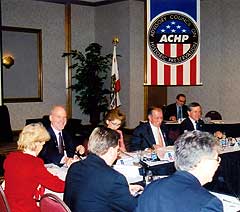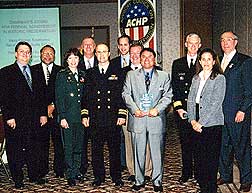 About ACHP
About ACHP ACHP News
National Historic
Preservation
Program
Working with
Section 106
Federal, State, & Tribal Programs
Training & Education
Publications
Search
Home
Presents Navy with ACHP Chairman's Award
 ACHP members met Feb. 18 in the Portola Plaza Hotel in Monterey, CA (staff photo) |
The ACHP reaffirmed the value of preservation easements by adopting a resolution during its quarterly business meeting Feb. 18 in Monterey, California.
The agency also passed a resolution that partially relieves Federal agencies from taking into account the effects of their projects on the soon-to-be-historic interstate highway system.
In addition, it presented the ACHP Chairman's Award for Federal Achievement in Historic Preservation to the Navy for renovating the 118-year-old lodging wings of Monterey's Hotel Del Monte, and established a task force to examine historic preservation in affordable housing. The ACHP also determined that the Bureau of Indian Affairs foreclosed the ACHP's opportunity to comment under Section 106 of the National Historic Preservation Act on a South Dakota reconstruction project.
ACHP
Issues Resolution on Preservation Easements
At the meeting, the ACHP acknowledged recent concerns about abuses of tax deductions for preservation easements. It pointed out, however, that easements placed on properties that are not covered by local preservation law may be the only mechanism that protects such properties.
Even when a local law does apply, the agency noted, the easement may provide more protection than the law, or may serve as a back up should provisions in the law be poorly enforced or manipulated so that the property is not protected.
In addition, encouraging property owners to voluntarily preserve their historic properties through the use of preservation easements supports the Administration's commitment to encouraging citizen stewardship and cooperative conservation of the Nation's resources.
The ACHP's resolution reaffirms the value of preservation easements for protecting and enhancing the Nation's cultural environment and implementing national preservation policy, and directs ACHP Chairman John L. Nau, III, to convey to Congress and the Administration:
- The importance of strong Federal tax incentives for preservation easements;
- The value of tax deductions for easements on residential properties, since the benefits to homeowners do not diminish the benefits to the general public of helping to preserve the fabric of their communities; and
- The need to identify and establish administrative reforms to prevent inappropriate use of tax deductions for preservation easements.
Text of the Resolution on Tax Benefits for Preservation Easements (in PDF)
ACHP
Approves Exemptions for the Interstate Highway System
The ACHP approved releasing Federal agencies from the requirement that they consider the effects of their undertakings on the U.S. interstate highway system, except for a limited number of individual elements associated with it.
The Federal Government had been challenged by the potential historic significance of the entire interstate highway system as its 50th anniversary approaches.
The exemption embodies the view that the interstate highway system is historically important, but only certain particularly important components of that system warrant consideration under Section 106 of the National Historic Preservation Act (NHPA) and would, therefore, be excluded from the exemption.
The exclusions are limited to:
- Elements that are at least 50 years old, possess national significance, and meet the National Register of Historic Places eligibility criteria (36 CFR Part 63);
- Elements that are less than 50 years old, possess national significance, meet the National Register eligibility criteria, and are of exceptional importance; and
- Elements that were listed in the National Register, or determined eligible for the National Register pursuant to 36 CFR Part 63, before the effective date of the exemption.
The exemption concerns only the effects of Federal undertakings on the
interstate
highway system, and does not alter the Section 106 review obligations regarding
any non-interstate highway system historic properties that may be affected by
an undertaking. Each Federal agency remains responsible for complying with Section
106 regarding effects of its undertakings on historic properties that are not
components of the interstate highway system.
The ACHP's approved exemption was published in the Federal Register March 7, 2005.
Navy
Receives ACHP Chairman's Award for Hotel Del Monte Renovations
 Chairman Nau (right) bestowed the Chairman's Award for Federal Achievement in Historic Preservation on the Navy at the ACHP business meeting Feb. 18 in Monterey, CA (staff photo) |
The ACHP presented the Navy Region Southwest and the Naval Postgraduate School with the ACHP Chairman's Award for Federal Achievement in Historic Preservation. The groups received the award for renovating the 118-year-old lodging wings of the Hotel Del Monte in Monterey, California.
ACHP
Task Force to Examine Historic Preservation in Affordable Housing
The ACHP established a task force to examine historic preservation in affordable housing. Chairman Nau appointed seven ACHP members to the task force, including the U.S. Departments of Agriculture and Interior representatives, with the U.S. Department of Housing and Urban Development as an observer.
The task force's primary focus will be to assess the ACHP's 10-year-old Policy Statement on Affordable Housing and Historic Preservation in light of changes to the Section 106 regulations and other ACHP historic preservation initiatives. The task force will also consider policy initiatives and outreach efforts that would promote historic preservation through the creation of affordable housing.
ACHP
Determines that Its Opportunity to Comment on South Dakota Reconstruction Project
Was Foreclosed
In another issue, the ACHP determined that the Bureau of Indian Affairs (BIA) did not allow the ACHP ample opportunity to comment on the reconstruction of Route 4 in Buffalo County, South Dakota. Section 106 requires Federal agencies to give the ACHP the opportunity to comment on the effects of their proposed projects on historic properties.
BIA proposes to reconstruct an eight-mile section of a highway that runs through the Crow Creek Reservation in South Dakota. Ten archeological sites might be affected by the construction; several of the sites are associated with a previously identified archeological district and a National Historic Landmark.
Reports indicate that the agency’s archeological investigation turned up numerous skeletal remains that may be ancestors of the Three Affiliated Tribes, comprised of the Mandan, Hidatsa, and Arikara Indians.
BIA reported that it consulted with the Crow Creek and Three Affiliated Tribes about appropriate procedures to remove and reinter the human remains. The person whom BIA identified as its Three Affiliated Tribes contact in this matter denies any contact, approval, or knowledge of the agency’s actions.
In light of the foreclosure of the ACHP's opportunity to comment on the proposed project, the ACHP agreed to recommend to the Secretary of the Interior the steps that BIA should take to avoid similar circumstances in the future.
-----
The ACHP, an independent Federal agency, promotes the preservation, enhancement,
and productive use of the Nation's historic resources and advises the President
and Congress on national historic preservation policy. It also provides a forum
for influencing Federal activities, programs, and policies that impact historic
properties. In addition, the ACHP has a key role in carrying out the Administration's
Preserve America program.
Posted March 25, 2005